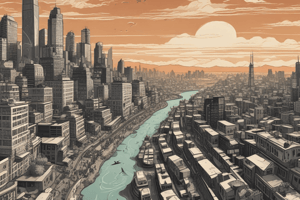Podcast
Questions and Answers
How does urbanization disrupt natural water cycles?
How does urbanization disrupt natural water cycles?
By altering landscapes and runoff patterns.
What happens to runoff in urban areas with impervious surfaces during heavy precipitation events?
What happens to runoff in urban areas with impervious surfaces during heavy precipitation events?
It flows directly into stormwater drainage systems, overwhelming them.
Why do green spaces play a crucial role in managing excess water in natural environments?
Why do green spaces play a crucial role in managing excess water in natural environments?
They act as natural sponges to absorb excess water.
How do altered landscapes in urban areas contribute to flooding risks?
How do altered landscapes in urban areas contribute to flooding risks?
What changes in the hydrological cycle are observed with increased urbanization?
What changes in the hydrological cycle are observed with increased urbanization?
Why is it essential to understand the impact of urbanization on water management?
Why is it essential to understand the impact of urbanization on water management?
How does urbanization impact the predictability of precipitation patterns?
How does urbanization impact the predictability of precipitation patterns?
What are some consequences of rapidly expanding cities lacking adequate infrastructure?
What are some consequences of rapidly expanding cities lacking adequate infrastructure?
Why is the disruption of natural flood defenses by urbanization concerning?
Why is the disruption of natural flood defenses by urbanization concerning?
Apart from urbanization, what other factor contributes to increased flooding?
Apart from urbanization, what other factor contributes to increased flooding?
What strategies can help reduce runoff and improve water management in urban areas?
What strategies can help reduce runoff and improve water management in urban areas?
Why is awareness of the impacts of urbanization on flood causes crucial?
Why is awareness of the impacts of urbanization on flood causes crucial?
Study Notes
Flooding Causes: Urbanization and Its Impact on Water Management
Urbanization refers to the transformation of rural areas into densely populated cities and towns. This process often disrupts natural water cycles and leads to increased flooding risks due to several factors. As our global population grows, it is crucial to understand these impacts and implement effective strategies to mitigate flood risk caused by urbanization. In this section, we will explore how urbanization affects water management and contributes to flooding events.
Altered Landscapes and Runoff Patterns
The construction of buildings and pavement in urban areas significantly alters the landscape's ability to absorb rainwater naturally. Instead of permeating through soil, runoff from impervious surfaces like rooftops and streets flows directly into stormwater drainage systems, overwhelming them during heavy precipitation events. This imbalance between rainfall and stormwater management can cause localized flooding.
Moreover, green spaces such as forests, grasslands, and wetlands - which typically act as natural sponges to absorb excess water - are replaced with concrete structures when urban development occurs. These altered landscapes result in more rapid and intense runoff, exacerbating flooding risks.
Changes in Hydrological Cycles
As urbanization increases, it modifies the regional hydrological cycle by altering land cover, increasing evapotranspiration, and changing surface temperatures. Consequently, precipitation patterns become less predictable, leading to higher variability in both drought periods and heavy rainfall events. With less predictable weather conditions comes an increased likelihood of severe flooding.
Population Growth and Infrastructure Strain
Rapidly expanding cities may lack adequate infrastructure to manage their growth. Outdated or insufficient sewage systems, combined with poorly planned stormwater drains and lacking emergency response plans, can lead to widespread flooding during high precipitation events. The demand for housing, transportation, and other services in urban areas also encourages haphazard development without proper consideration for flood risk management.
Disruption of Natural Flood Defenses
Urbanization often disrupts natural flood defenses like wetlands, floodplains, and ravines, which act as buffers against floodwaters. These areas are essential for maintaining ecosystem health and mitigating the impact of extreme weather events. By removing them from urban landscapes, cities may be more vulnerable to flood damage.
Climate Change and Its Impact on Flooding
Urbanization is not the only factor contributing to increased flooding. Climate change, which is causing more frequent and intense storms, also plays a significant role. As temperatures rise, so does evapotranspiration, leading to higher levels of moisture in the atmosphere. When storms hit urban areas with already compromised water management systems, catastrophic flooding can occur.
Conclusion
Urbanization has profound impacts on flood causes, worsening existing risks and creating new challenges. Awareness of these issues is crucial for policymakers, city planners, and residents alike. Implementing green infrastructure strategies, such as rain gardens, bioswales, and permeable pavement, can help reduce runoff and improve overall water management. Additionally, investing in more robust sewage and stormwater systems, combined with better land use planning, will aid in minimizing flooding risks associated with rapid urban growth.
Studying That Suits You
Use AI to generate personalized quizzes and flashcards to suit your learning preferences.
Description
Test your knowledge on how urbanization impacts water management and contributes to flooding events. Explore topics such as altered landscapes, changes in hydrological cycles, population growth challenges, and disruption of natural flood defenses.




